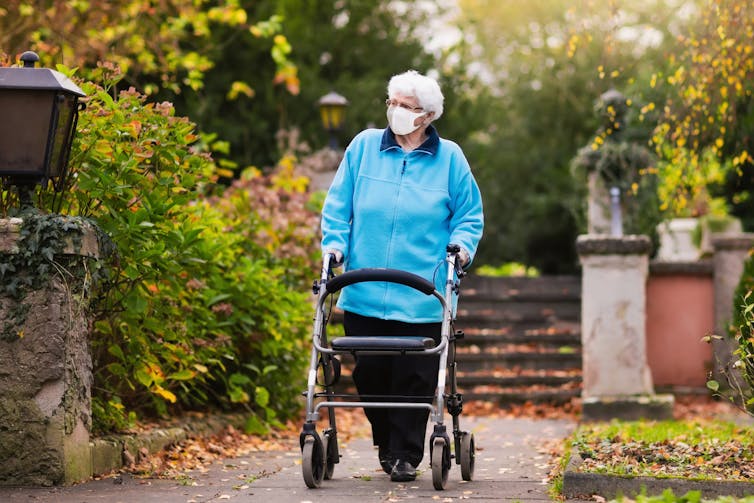
Widespread media reports have highlighted the concerning rise in domestic violence because of lockdown. Much of these reports have focused on the impact on women and children. However, many older adult victims of domestic violence are also at significant risk during the pandemic.
Older adults are more at risk from coronavirus due to age-related vulnerability often resulting from pre-existing health conditions. But safety measures put in place to protect them from the virus may also be placing them at greater risk of experiencing elder abuse. Factors including isolation, depression and unemployment are all increasing because of the global pandemic – and these have been identified as risk factors in cases of elder abuse.
Adding to this problem is increased strain on health and social care services for older adults – partly because of heightened demand and staff shortages as a result of furlough. Older adults may therefore face the difficult choice of staying in an abusive situation (with less professional support) or fleeing the situation (with limited options of places they can go) but increasing their risk of contracting COVID-19.
Research into elder abuse has identified a number of factors that increase the risk of abuse.
Perpetrators of elder abuse are more likely to:
Be dependent on the older adult victim: This dependence is often caused by unemployment or having low income. It may also be due to mental health or substance abuse problems. The global pandemic and subsequent lockdown has increased rates of unemployment and decreased income for many.
Suffer from mental health problems, particularly depression: Lockdown and social isolation has increased stress, reduced social contact and time outdoors, which are all associated with depression.
Feel highly stressed and lack the ability to cope: A pandemic is a highly stressful event and the lockdown has limited some of our usual coping mechanisms, such as socialising and playing sports.
Report feeling more socially isolated and less supported: Reducing social contact is the objective of the lockdown and could lead to reduced social support.
Report feeling resentful of and unhappy with their caregiving roles: The need to shield older adults from the virus may lead to increased caring responsibilities, such as getting food and medicine for older relatives.
Victims of elder abuse are also more likely to be dependent on others for support and functional needs such as cooking and personal care. During social distancing, older adults may become more dependent on others. They may also be socially isolated or lack social support, which are also risk factors for abuse.
Limited contact with friends and family to protect from the virus can also mean that the victim has fewer people to talk to about the abuse they may be experiencing. This also means there may be fewer people around to notice signs of abuse.

Victims of elder abuse are also more likely to report mental health problems – particularly depression, high stress and an inability to cope evidenced by behaviours such as self-neglect. All of these could be worsened during lockdown.
Elder abuse tends to be more common in communities where victims and perpetrators lack mental health treatment or social care resources in the community. Lockdown has increased demand for these services – but many of the organisations that provide the services have decreased funding and staff. Many older adults may not be able to access services that have moved online as a result of the pandemic – and many may be unable to pay for necessary care and treatment.
Sadly, many measures taken to protect older adults from coronavirus may inadvertently create conditions that increase instances of elder abuse. It is important to rethink how services are provided in order to stop this from happening.
One barrier to reporting elder abuse is lack of knowledge about services. It will be important to raise awareness about available services among older adults – especially about services available in their community and how they can safely and privately access these services.
For these service and for criminal justice institutions, targeting older adults most at risk could be done by using tools such as the Elder Abuse Risk Level Index (EARLI). The EARLI is a risk-assessment tool that guides users in identifying the risk of elder abuse in a given case and putting strategies in place to keep the older adult safe.
Only about one in 24 cases of elder abuse is reported. And where victims are isolated with their abusers, they may be even less likely or able to ask for help during the lockdown period. It’s critically important to check in on known victims of elder abuse and on older adults who are particularly vulnerable.
We should also be increasing general awareness about the signs of elder abuse and how to respectfully talk to older adults about abuse. This will allow friends and family to identify signs of abuse, seek help and advice from services and talk to loved ones. Anyone can report suspected elder abuse or reach out for guidance from elder abuse services.
More awareness and action can protect older adults during this pandemic, and in the future.
This story was originally published on The Conversation by Lecturer in Forensic Psychology, University of Kent and University of Sheffield
If you or someone you know is experiencing elder abuse, contact:
New South Wales: NSW Elder Abuse Helpline and Resource Unit
ACT: Older Persons ACT Legal Service (OPALS)
Victoria: Seniors Rights Victoria
South Australia: Aged Rights Advocacy Service
Western Australia: Advocare
Tasmania: Tasmanian Elder Abuse Helpline